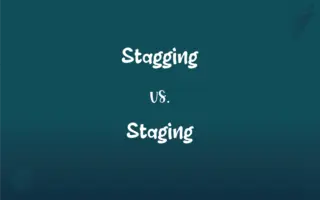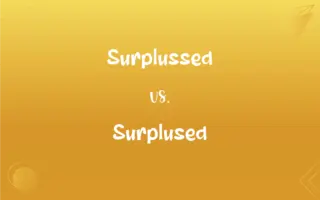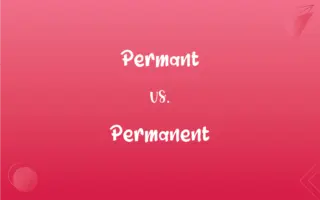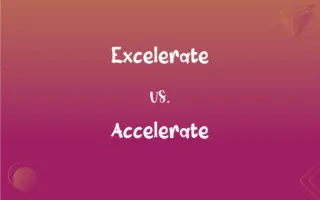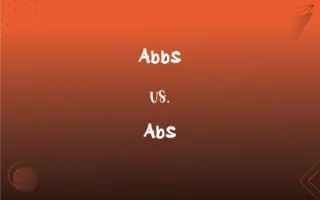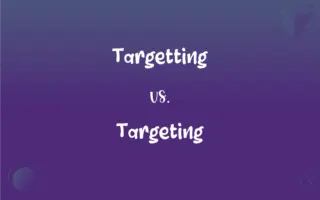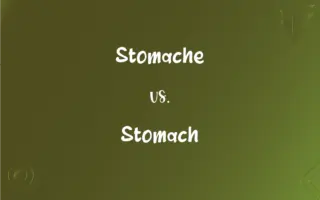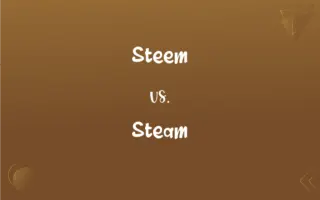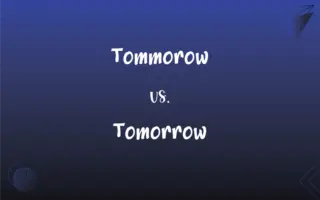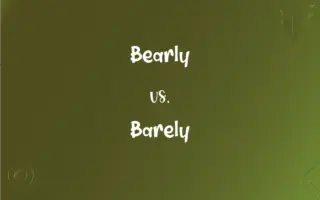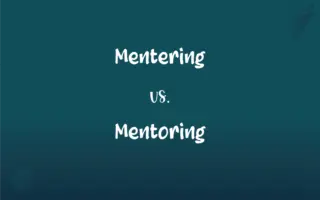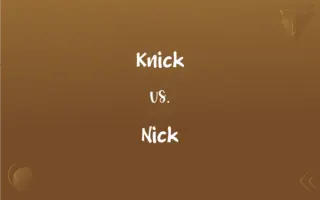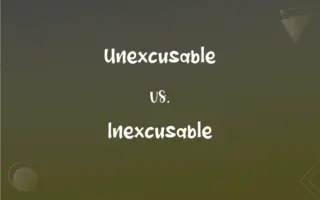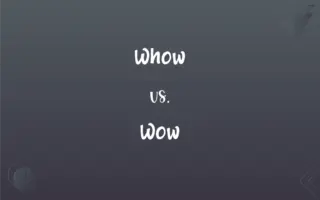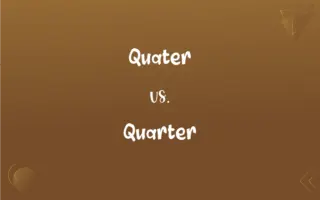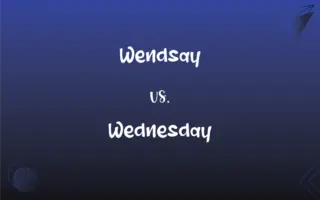Inittially vs. Initially: Mastering the Correct Spelling
Edited by Aimie Carlson || By Janet White || Published on March 11, 2024
"Inittially" is an incorrect spelling; the correct spelling is "initially" which means at the beginning or start.

Which is correct: Inittially or Initially
How to spell Initially?

Inittially is Incorrect

Initially is Correct
ADVERTISEMENT
Key Differences
Think of "initially" as the adverb form of "initial," keeping the spelling consistent.
Note there's only one "t" in "initially," similar to "initial."
Remember that "initial" relates to the start, and "initially" follows the same pattern without doubling the "t."
Break down "initially" into parts: "initial-ly," focusing on the correct spelling of "initial" plus the adverbial suffix "-ly."
Use "initially" in sentences to reinforce the correct spelling through practice.
ADVERTISEMENT
Correct usage of Initially
My brother wanted to go to the park inittially, but then he decided to stay home.
My brother wanted to go to the park initially, but then he decided to stay home.
I inittially disagreed with the idea, but I've come to see its benefits.
I initially disagreed with the idea, but I've come to see its benefits.
She said she would inittially help with the project, but she never showed up.
She said she would initially help with the project, but she never showed up.
The plan was inittially to leave at dawn, but it was too foggy.
The plan was initially to leave at dawn, but it was too foggy.
Initially, I thought the movie was boring, but it got better.
Initially Definitions
Referring to the first stage or phase.
He was initially reluctant to join.
In the early stages or at the outset.
The plan was initially approved by all.
At the beginning or start.
Initially, the project seemed simple.
Before anything else or as a first step.
Initially, we must assess the situation.
Denoting the original or first mentioned state.
She initially disagreed, but later changed her mind.
Of, relating to, or occurring at the beginning; first
Took the initial step toward peace.
Designating the first letter or letters of a word.
The first letter of a proper name.
Initials The first letter of each word of a person's full name considered as a unit
Stationery monogrammed with her initials.
The first letter of a word.
A large, often highly decorated letter set at the beginning of a chapter, verse, or paragraph.
To mark or sign with initials, especially for purposes of authorization or approval.
At the beginning.
Initially, I found city life incredibly difficult, but now I'm used to it.
In an initial or incipient manner or degree; at the beginning.
At the beginning;
At first he didn't notice anything strange
Initially Sentences
The movie was initially confusing, but the ending tied everything together.
Initially, the book seemed hard to read, but it got easier as I continued.
The weather was initially sunny, but it started raining in the afternoon.
Initially, she didn't like broccoli, but now it's her favorite vegetable.
Initially, the dog was scared of the water, but now he loves swimming.
Initially, I was hesitant to try sushi, but I really like it now.
Initially, the puzzle seemed impossible, but we solved it together.
She initially didn't want to move to a new city, but she loves it now.
The team was initially behind, but they made a great comeback.
The project seemed overwhelming initially, but breaking it down into steps helped.
He was initially afraid of heights, but he overcame his fear.
Initially, I thought I had lost my keys, but I found them in my bag.
I initially resisted learning to code, but now I enjoy it.
Initially, the cat was wary of the new kitten, but now they are best friends.
Initially, I was not excited about the trip, but it turned out to be amazing.
Initially, he didn't understand the joke, but then he laughed.
Initially, the road was clear, but then we hit traffic.
Initially, we planned to walk to the park, but we decided to bike instead.
I initially struggled with math, but with help, I improved a lot.
Initially, they didn't get along, but now they're inseparable.
The recipe seemed complicated initially, but it was actually quite simple.
The task was daunting at first, but it felt rewarding once completed.
Our vacation plan was to stay at the beach initially, but we ended up exploring the city too.
The software was initially difficult to use, but after some practice, it became easy.
Initially, I was not sure about the new design, but it looks great.
FAQs
What is the root word of initially?
The root word is "initial."
Which vowel is used before initially?
The letter "i" is used before "nitially" in "initially."
What is the pronunciation of initially?
Initially is pronounced as /ɪˈnɪʃəli/.
What is the verb form of initially?
"Initially" is an adverb, derived from the adjective "initial," but does not have a direct verb form.
What is the plural form of initially?
As an adverb, "initially" does not have a plural form.
Which conjunction is used with initially?
Conjunctions like "and," "but," or "or" can be used with "initially" depending on the sentence structure.
Is initially an adverb?
Yes, "initially" is an adverb.
Why is it called initially?
It's called "initially" because it pertains to the beginning or initial part of something.
What is the singular form of initially?
"Initially" is an adverb and does not have singular or plural forms.
Which preposition is used with initially?
"Initially" can be used with various prepositions depending on context, such as "initially in" or "initially by."
Is initially an abstract noun?
"Initially" is not a noun; it's an adverb.
Is initially a negative or positive word?
"Initially" is neutral; it can be used in both positive and negative contexts depending on the sentence.
Is initially a vowel or consonant?
"Initially" is a word, not a vowel or consonant, but it starts with the vowel "i."
Is the initially term a metaphor?
"Initially" can be used metaphorically to describe the beginning phase of abstract concepts.
Is the word initially is imperative?
"Initially" is not used in the imperative mood as it's an adverb, not a verb.
How do we divide initially into syllables?
"Initially" is divided as i-ni-ti-al-ly.
What is the opposite of initially?
The opposite of "initially" could be "finally" or "ultimately."
What is the first form of initially?
"Initially" is an adverb and does not have verb forms.
Which article is used with initially?
As an adverb, "initially" typically does not directly follow an article.
What is a stressed syllable in initially?
The stressed syllable in "initially" is "ni."
What is the second form of initially?
As an adverb, "initially" does not have a second form.
What is the third form of initially?
As an adverb, "initially" does not have a third form.
Is initially a noun or adjective?
Initially is an adverb.
Is initially a collective noun?
No, "initially" is an adverb, not a noun.
What part of speech is initially?
"Initially" is an adverb.
What is another term for initially?
Another term for "initially" could be "originally" or "at first."
Which determiner is used with initially?
As an adverb, "initially" does not typically use determiners.
How is initially used in a sentence?
"Initially, the idea faced much skepticism, but it eventually gained widespread acceptance."
Is initially a countable noun?
"Initially" is not a noun; it's an adverb and does not have a countable form.
How many syllables are in initially?
There are four syllables in "initially."
About Author
Written by
Janet WhiteJanet White has been an esteemed writer and blogger for Difference Wiki. Holding a Master's degree in Science and Medical Journalism from the prestigious Boston University, she has consistently demonstrated her expertise and passion for her field. When she's not immersed in her work, Janet relishes her time exercising, delving into a good book, and cherishing moments with friends and family.
Edited by
Aimie CarlsonAimie Carlson, holding a master's degree in English literature, is a fervent English language enthusiast. She lends her writing talents to Difference Wiki, a prominent website that specializes in comparisons, offering readers insightful analyses that both captivate and inform.


